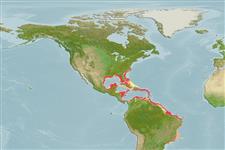Teleostei (teleosts) >
Acanthuriformes (Surgeonfishes) >
Chaetodontidae (Butterflyfishes)
Etymology: Chaetodon: Greek, chaite = hair + Greek, odous = teeth (Ref. 45335).
More on author: Poey.
Environment: milieu / climate zone / depth range / distribution range
Ecology
Marine; reef-associated; depth range 5 - 92 m (Ref. 9710), usually 15 - 40 m (Ref. 55199). Subtropical; 36°N - 25°S, 98°W - 33°W
Western Atlantic: North Carolina, USA to northern South America, including the eastern Gulf of Mexico and the Caribbean Sea. Eastern Atlantic.
Length at first maturity / Size / Weight / Age
Maturity: Lm ?, range 8 - ? cm
Max length : 15.0 cm TL male/unsexed; (Ref. 4858)
Dorsal spines (total): 13 - 14; Dorsal soft rays (total): 20 - 22; Anal spines: 3; Anal soft rays: 17 - 19. Edges of the scales yellowish on back; a black bar on head through eye; a broad blackish bar across caudal peduncle which extends into soft portions of dorsal fin above and anal fin below; caudal fin light yellow, white at base (Ref. 13442).
Inhabit coral reefs. Prefer to feed on eggs of Abudefduf saxatilis (Ref. 9626) but also on polychaete worms, shrimps, amphipods and hydroids. Oviparous (Ref. 205). Form pairs during breeding (Ref. 205).
Distinct pairing (Ref. 205).
Allen, G.R., 1985. Butterfly and angelfishes of the world. Vol. 2. 3rd edit. in English. Mergus Publishers, Melle, Germany. (Ref. 4858)
IUCN Red List Status (Ref. 130435: Version 2024-1)
Threat to humans
Reports of ciguatera poisoning (Ref. 30303)
Human uses
Fisheries: commercial; aquarium: commercial
Tools
Special reports
Download XML
Internet sources
Estimates based on models
Preferred temperature (Ref.
123201): 22.7 - 28, mean 26.1 °C (based on 274 cells).
Phylogenetic diversity index (Ref.
82804): PD
50 = 0.5000 [Uniqueness, from 0.5 = low to 2.0 = high].
Bayesian length-weight: a=0.02344 (0.01389 - 0.03957), b=3.02 (2.87 - 3.17), in cm total length, based on LWR estimates for this species & Genus-body shape (Ref.
93245).
Trophic level (Ref.
69278): 3.9 ±0.4 se; based on diet studies.
Resilience (Ref.
120179): Medium, minimum population doubling time 1.4 - 4.4 years (Fec = 7,800).
Fishing Vulnerability (Ref.
59153): Low vulnerability (10 of 100).
Nutrients (Ref.
124155): Calcium = 61.8 [27.2, 144.5] mg/100g; Iron = 0.822 [0.414, 1.581] mg/100g; Protein = 19.5 [18.2, 20.8] %; Omega3 = 0.218 [0.112, 0.427] g/100g; Selenium = 18.1 [7.6, 38.5] μg/100g; VitaminA = 33.4 [7.7, 149.5] μg/100g; Zinc = 0.867 [0.513, 1.354] mg/100g (wet weight);
